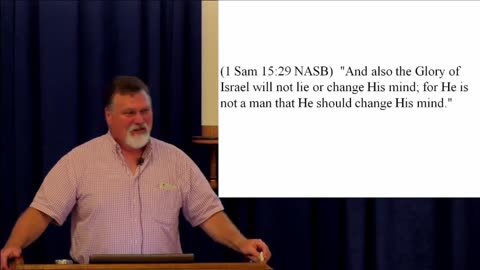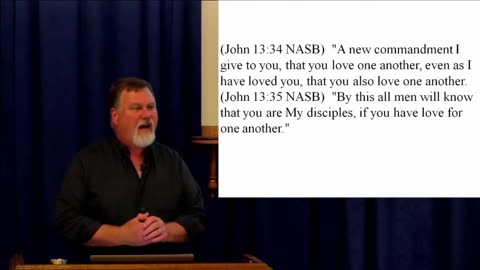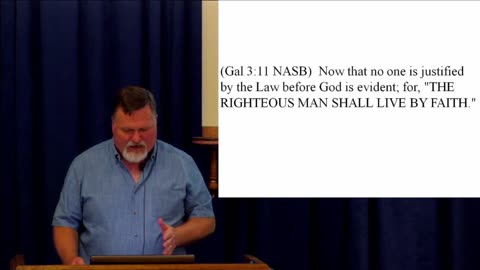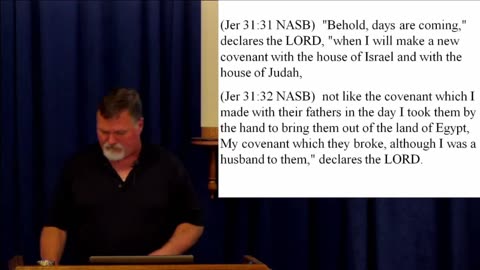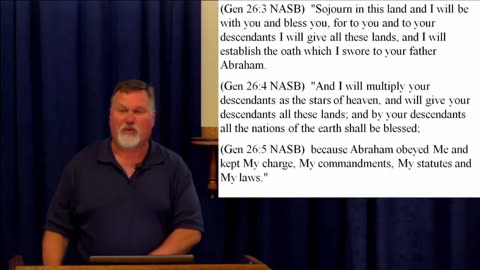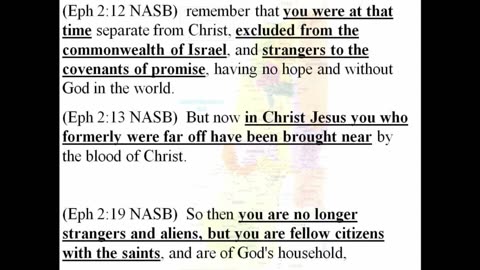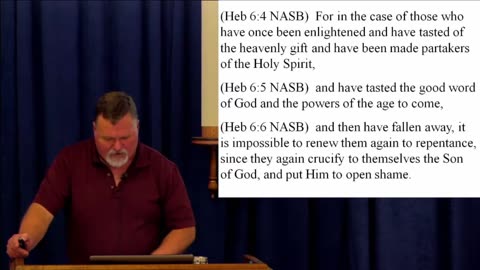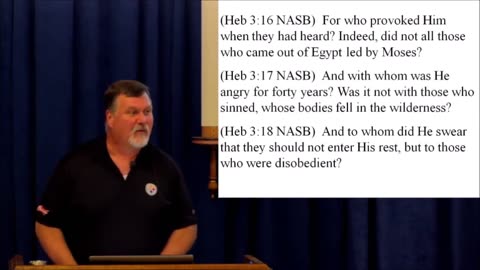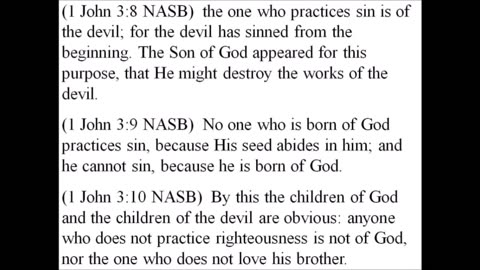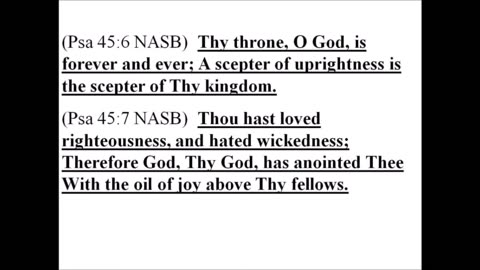-
Hebrews 13 – A warning against following false doctrines and false gods. 2018
 RVTAHeb 13:9 Do not be carried away by varied and strange teachings; for it is good for the heart to be strengthened by grace, not by foods, through which those who were thus occupied were not benefited. It would appear that Paul is dealing with a problem with the Hebrews that is not otherwise specified. "Do not be carried away with various and strange doctrines." This is a warning against following false doctrines and false gods. This was astutely warned against in the Torah. Deut. 31:16-18 And the LORD said to Moses, “Behold, you are about to lie down with your fathers; and this people will arise and play the harlot with the strange gods of the land, into the midst of which they are going, and will forsake Me and break My covenant which I have made with them. 17“Then My anger will be kindled against them in that day, and I will forsake them and hide My face from them, and they shall be consumed, and many evils and troubles shall come upon them; so that they will say in that day, ‘Is it not because our God is not among us that these evils have come upon us?’ 18“But I will surely hide My face in that day because of all the evil which they will do, for they will turn to other gods. Our heart is to be strengthened by grace. Paul warns that our heart is not strengthened with the animal sacrifice. (I believe that is what he is referring to here...) This chapter contains a number of concluding exhortations that promote law-abiding holiness. The emphasis is very practical and reminds us that our faithfulness in Yeshua must always show forth in our actions. This chapter begins with "Let brotherely love continue." This is the long-standing and powerful command given in Leviticus to "love your neighbor as yourself" (Lev. 19:18, 19:34-not shown).36 views 1 comment
RVTAHeb 13:9 Do not be carried away by varied and strange teachings; for it is good for the heart to be strengthened by grace, not by foods, through which those who were thus occupied were not benefited. It would appear that Paul is dealing with a problem with the Hebrews that is not otherwise specified. "Do not be carried away with various and strange doctrines." This is a warning against following false doctrines and false gods. This was astutely warned against in the Torah. Deut. 31:16-18 And the LORD said to Moses, “Behold, you are about to lie down with your fathers; and this people will arise and play the harlot with the strange gods of the land, into the midst of which they are going, and will forsake Me and break My covenant which I have made with them. 17“Then My anger will be kindled against them in that day, and I will forsake them and hide My face from them, and they shall be consumed, and many evils and troubles shall come upon them; so that they will say in that day, ‘Is it not because our God is not among us that these evils have come upon us?’ 18“But I will surely hide My face in that day because of all the evil which they will do, for they will turn to other gods. Our heart is to be strengthened by grace. Paul warns that our heart is not strengthened with the animal sacrifice. (I believe that is what he is referring to here...) This chapter contains a number of concluding exhortations that promote law-abiding holiness. The emphasis is very practical and reminds us that our faithfulness in Yeshua must always show forth in our actions. This chapter begins with "Let brotherely love continue." This is the long-standing and powerful command given in Leviticus to "love your neighbor as yourself" (Lev. 19:18, 19:34-not shown).36 views 1 comment -
Hebrews 12 - We're to pursue peace and holiness. Without it things, we will not see the Master. 2018
 RVTAHeb 12:14 Pursue peace with all men, and the sanctification without which no one will see the Lord. We are to pursue peace and holiness. Without those things, we will not see the Master. In this chapter Paul talks about Yeshua being the "author and finisher of our faithfulness." The faithfulness that we have is not anything that we mustered up, nor is it us that maintains it. Yeshua Himself is the author and finisher of it all! Paul also talks about disciplining us. Believe it or not, that is another gift from the Father for which we should be grateful!36 views 1 comment
RVTAHeb 12:14 Pursue peace with all men, and the sanctification without which no one will see the Lord. We are to pursue peace and holiness. Without those things, we will not see the Master. In this chapter Paul talks about Yeshua being the "author and finisher of our faithfulness." The faithfulness that we have is not anything that we mustered up, nor is it us that maintains it. Yeshua Himself is the author and finisher of it all! Paul also talks about disciplining us. Believe it or not, that is another gift from the Father for which we should be grateful!36 views 1 comment -
Hebrews 11 - What happens when we seek Him? 2018
 RVTAHeb 11:5 By faith Enoch was taken up so that he should not see death; AND HE WAS NOT FOUND BECAUSE GOD TOOK HIM UP; for he obtained the witness that before his being taken up he was pleasing to God. Heb 11:6 And without faith it is impossible to please Him, for he who comes to God must believe that He is, and that He is a rewarder of those who seek Him. Before Enoch was taken, he had this testimony, "that he pleased Elohim." How did he do that? The Book of Enoch tells us that Enoch received the Law of Elohim from angels and that he preached righteousness. Why did he receive the law and why did he preach righteousness? It is because he was faithful to Elohim and loved Him. It is impossible to please Him without seeking Him. We are to trust the He is a rewarder of those who diligently seek Him. What happens when we seek Him? We have several examples of this in Scripture. Kings of Judah, Asa and Hezekiah, sought Elohim and followed His Torah in obedience. 2 Chron. 14:2-4 And Asa did good and right in the sight of the LORD his God, 3for he removed the foreign altars and high places, tore down the sacred pillars, cut down the Asherim, 4and commanded Judah to seek the LORD God of their fathers and to observe the law and the commandment. 2 Chron. 31:20-21 And thus Hezekiah did throughout all Judah; and he did what was good, right, and true before the LORD his God. 21And every work which he began in the service of the house of God in law and in commandment, seeking his God, he did with all his heart and prospered. The Psalms tell us that without conviction, there are none who seek Him and none who do good. Psalm 14:1-3 The fool has said in his heart, “There is no God.” They are corrupt, they have committed abominable deeds; There is no one who does good. 2The LORD has looked own from heaven upon the sons of men, To see if there are any who understand, Who seek after God. 3They have all turned aside; together they have become corrupt; There is no one who does good, not even one. Isaiah says that if we seek Him daily, we will delight in His ways. Isaiah 58:1-2 “Cry loudly, do not hold back; Raise your voice like a trumpet, And declare to My people their transgression, And to the house of Jacob their sins. 2“Yet they seek Me day by day, and delight to know My ways, As a nation that has done righteousness, And has not forsaken the ordinance of their God. They ask Me for just decisions, They delight in the nearness of God. Scripture abound in those examples.... This chapter has been called "the faith chapter" by many Christian teachers. The NASB begins with: "Now faith is the assurance of things hoped for, the conviction of things not seen." "Faith" comes from the Greek word "pistis." Pistis can mean either "faith" or "faithfulness" according to most any concordance. There are evidences that show that the word should always be translated as "faithfulness." This verse and this entire chapter are excellent examples. Faithfulness is the assurance hoped for, the conviction of things not seen. In the NKJV, "faithfulness is the substance of things hoped for, the evidence of things not seen." It is saying that our faithfulness is a gift from Elohim that is the substance of things hoped for. Our faithfulness is the evidence of things not seen. Faithfulness consists of objective action, whereas "faith" is merely an emotion. Join us and see if what we say isn't true according to Scripture (but maybe not your dogma...)35 views
RVTAHeb 11:5 By faith Enoch was taken up so that he should not see death; AND HE WAS NOT FOUND BECAUSE GOD TOOK HIM UP; for he obtained the witness that before his being taken up he was pleasing to God. Heb 11:6 And without faith it is impossible to please Him, for he who comes to God must believe that He is, and that He is a rewarder of those who seek Him. Before Enoch was taken, he had this testimony, "that he pleased Elohim." How did he do that? The Book of Enoch tells us that Enoch received the Law of Elohim from angels and that he preached righteousness. Why did he receive the law and why did he preach righteousness? It is because he was faithful to Elohim and loved Him. It is impossible to please Him without seeking Him. We are to trust the He is a rewarder of those who diligently seek Him. What happens when we seek Him? We have several examples of this in Scripture. Kings of Judah, Asa and Hezekiah, sought Elohim and followed His Torah in obedience. 2 Chron. 14:2-4 And Asa did good and right in the sight of the LORD his God, 3for he removed the foreign altars and high places, tore down the sacred pillars, cut down the Asherim, 4and commanded Judah to seek the LORD God of their fathers and to observe the law and the commandment. 2 Chron. 31:20-21 And thus Hezekiah did throughout all Judah; and he did what was good, right, and true before the LORD his God. 21And every work which he began in the service of the house of God in law and in commandment, seeking his God, he did with all his heart and prospered. The Psalms tell us that without conviction, there are none who seek Him and none who do good. Psalm 14:1-3 The fool has said in his heart, “There is no God.” They are corrupt, they have committed abominable deeds; There is no one who does good. 2The LORD has looked own from heaven upon the sons of men, To see if there are any who understand, Who seek after God. 3They have all turned aside; together they have become corrupt; There is no one who does good, not even one. Isaiah says that if we seek Him daily, we will delight in His ways. Isaiah 58:1-2 “Cry loudly, do not hold back; Raise your voice like a trumpet, And declare to My people their transgression, And to the house of Jacob their sins. 2“Yet they seek Me day by day, and delight to know My ways, As a nation that has done righteousness, And has not forsaken the ordinance of their God. They ask Me for just decisions, They delight in the nearness of God. Scripture abound in those examples.... This chapter has been called "the faith chapter" by many Christian teachers. The NASB begins with: "Now faith is the assurance of things hoped for, the conviction of things not seen." "Faith" comes from the Greek word "pistis." Pistis can mean either "faith" or "faithfulness" according to most any concordance. There are evidences that show that the word should always be translated as "faithfulness." This verse and this entire chapter are excellent examples. Faithfulness is the assurance hoped for, the conviction of things not seen. In the NKJV, "faithfulness is the substance of things hoped for, the evidence of things not seen." It is saying that our faithfulness is a gift from Elohim that is the substance of things hoped for. Our faithfulness is the evidence of things not seen. Faithfulness consists of objective action, whereas "faith" is merely an emotion. Join us and see if what we say isn't true according to Scripture (but maybe not your dogma...)35 views -
Hebrews 10 - What happened that makes us be sanctified? 2018
 RVTAHeb 10:14 For by one offering He has perfected for all time those who are sanctified. By this one offering He has perfected forever those who are being brought closer to Him (sanctified). What happened that makes us be sanctified? In keeping with the theme in Hebrews 8 and 9, it is the writing of the Torah in our hearts and in our minds. This was done through the blood of Messiah. Torah has shadows of the good things to come. The Torah, particularly the offerings, were not the very form of the sacrifice of Yeshua through which we receive the Spirit of the Father. The sacrifices could never make the offeror or anyone for that matter, perfect. A much better sacrifice was necessary for man's salvation.37 views
RVTAHeb 10:14 For by one offering He has perfected for all time those who are sanctified. By this one offering He has perfected forever those who are being brought closer to Him (sanctified). What happened that makes us be sanctified? In keeping with the theme in Hebrews 8 and 9, it is the writing of the Torah in our hearts and in our minds. This was done through the blood of Messiah. Torah has shadows of the good things to come. The Torah, particularly the offerings, were not the very form of the sacrifice of Yeshua through which we receive the Spirit of the Father. The sacrifices could never make the offeror or anyone for that matter, perfect. A much better sacrifice was necessary for man's salvation.37 views -
Hebrews 9- Messiahs not returning to pay for sin. He is coming to gather who eagerly await Him. 2018
 RVTAHeb 9:28 so Christ also, having been offered once to bear the sins of many, shall appear a second time for salvation without reference to sin, to those who eagerly await Him. Messiah is not returning to pay for sin again. He is coming to gather those who eagerly await Him. This chapter is a continuation of the theme of the previous chapter. Paul is building upon the theme of the New Covenant Yahweh has with Israel compared to the Old Covenant that was made on Mount Sinai. The Old Covenant consisted of the people agreeing to obey Elohim and all His laws, statutes, ordinances, and commandments. If they would do so, then He would be their Elohim and they would be His people (Ex. 19:3-8). This first covenant failed due to the disobedience of the people. The New Covenant (only with Israel) is Yahweh writing His Torah into our hearts and on our minds (Heb. 8:7-13). The content of the two covenants is the same. It still consists of Elohim's Torah. But the conditions of the covenant are what was changed. The New Covenant brings salvation and the enablement to follow Elohim's Law whereas the Old Covenant was man's attempt at righteousness on his own. The Old Covenant dealt with an earthly priest from the tribe of Levi. The New Covenant brings salvation through Yeshua Messiah, our perfect High Priest after the order of Melchizedek. Since the New Covenant requires a perfect High Priest, the law concerning the priest being from the tribe of Levi had to be set aside. This sets the scene for chapter 9...29 views
RVTAHeb 9:28 so Christ also, having been offered once to bear the sins of many, shall appear a second time for salvation without reference to sin, to those who eagerly await Him. Messiah is not returning to pay for sin again. He is coming to gather those who eagerly await Him. This chapter is a continuation of the theme of the previous chapter. Paul is building upon the theme of the New Covenant Yahweh has with Israel compared to the Old Covenant that was made on Mount Sinai. The Old Covenant consisted of the people agreeing to obey Elohim and all His laws, statutes, ordinances, and commandments. If they would do so, then He would be their Elohim and they would be His people (Ex. 19:3-8). This first covenant failed due to the disobedience of the people. The New Covenant (only with Israel) is Yahweh writing His Torah into our hearts and on our minds (Heb. 8:7-13). The content of the two covenants is the same. It still consists of Elohim's Torah. But the conditions of the covenant are what was changed. The New Covenant brings salvation and the enablement to follow Elohim's Law whereas the Old Covenant was man's attempt at righteousness on his own. The Old Covenant dealt with an earthly priest from the tribe of Levi. The New Covenant brings salvation through Yeshua Messiah, our perfect High Priest after the order of Melchizedek. Since the New Covenant requires a perfect High Priest, the law concerning the priest being from the tribe of Levi had to be set aside. This sets the scene for chapter 9...29 views -
Hebrews 7 and 8 - Who is the New Covenant with? 2018
 RVTAHeb 8:8 For finding fault with them, He says, "BEHOLD, DAYS ARE COMING, SAYS THE LORD, WHEN I WILL EFFECT A NEW COVENANT WITH THE HOUSE OF ISRAEL AND WITH THE HOUSE OF JUDAH; The New Covenant as described here is a direct quote from Jeremiah 31:31-34. Jeremiah 31:31-34 “Behold, days are coming,” declares the LORD, “when I will make a new covenant with the house of Israel and with the house of Judah, 32not like the covenant which I made with their fathers in the day I took them by the hand to bring them out of the land of Egypt, My covenant which they broke, although I was a husband to them,” declares the LORD. 33“But this is the covenant which I will make with the house of Israel after those days,” declares the LORD, “I will put My law within them, and on their heart I will write it; and I will be their God, and they shall be My people. 34“And they shall not teach again, each man his neighbor and each man his brother, saying, ‘Know the LORD,’ for they shall all know Me, from the least of them to the greatest of them,” declares the LORD, “for I will forgive their iniquity, and their sin I will remember no more.” Who is the New Covenant with? It is not with "the New Testament Church" or any new group or organization. It is made with "Israel" and "Judah." We are a part of Israel (and hence a part of the New Covenant) if we have a heart for His Torah. Eph. 2:12-13 remember that you were at that time separate from Christ, excluded from the commonwealth of Israel, and strangers to the covenants of promise, having no hope and without God in the world. 13But now in Christ Jesus you who formerly were far off have been brought near by the blood of Christ. Eph 2:19 So then you are no longer strangers and aliens, but you are fellow citizens with the saints, and are of God’s household, Eph 3:6 to be specific, that the Gentiles are fellow heirs and fellow members of the body, and fellow partakers of the promise in Christ Jesus through the gospel, Rom. 11:25 For I do not want you, brethren, to be uninformed of this mystery, lest you be wise in your own estimation, that a partial hardening has happened to Israel until the fulness of the Gentiles has come in; Paul starts this section with a discussion of Melchizedek. in order to properly set up chapter 7, we need to take a running start and look at the end of the last chapter (Heb. 6:19-20), He was a priest of the Father before the Levites were even conceived. Paul writes that Messiah is the anchor of our soul and our high priest forever according to theorder of Melchizedek. Melchizedek comes onto the scene early in Genesis after Abram saves his nephew, Lot, from Chedarloamer (Ked-ar-la-omar) and three other kings. He is greeted by the king of Sodom and Melchizedek. He is discussed in Gen. 14:18-20.36 views 1 comment
RVTAHeb 8:8 For finding fault with them, He says, "BEHOLD, DAYS ARE COMING, SAYS THE LORD, WHEN I WILL EFFECT A NEW COVENANT WITH THE HOUSE OF ISRAEL AND WITH THE HOUSE OF JUDAH; The New Covenant as described here is a direct quote from Jeremiah 31:31-34. Jeremiah 31:31-34 “Behold, days are coming,” declares the LORD, “when I will make a new covenant with the house of Israel and with the house of Judah, 32not like the covenant which I made with their fathers in the day I took them by the hand to bring them out of the land of Egypt, My covenant which they broke, although I was a husband to them,” declares the LORD. 33“But this is the covenant which I will make with the house of Israel after those days,” declares the LORD, “I will put My law within them, and on their heart I will write it; and I will be their God, and they shall be My people. 34“And they shall not teach again, each man his neighbor and each man his brother, saying, ‘Know the LORD,’ for they shall all know Me, from the least of them to the greatest of them,” declares the LORD, “for I will forgive their iniquity, and their sin I will remember no more.” Who is the New Covenant with? It is not with "the New Testament Church" or any new group or organization. It is made with "Israel" and "Judah." We are a part of Israel (and hence a part of the New Covenant) if we have a heart for His Torah. Eph. 2:12-13 remember that you were at that time separate from Christ, excluded from the commonwealth of Israel, and strangers to the covenants of promise, having no hope and without God in the world. 13But now in Christ Jesus you who formerly were far off have been brought near by the blood of Christ. Eph 2:19 So then you are no longer strangers and aliens, but you are fellow citizens with the saints, and are of God’s household, Eph 3:6 to be specific, that the Gentiles are fellow heirs and fellow members of the body, and fellow partakers of the promise in Christ Jesus through the gospel, Rom. 11:25 For I do not want you, brethren, to be uninformed of this mystery, lest you be wise in your own estimation, that a partial hardening has happened to Israel until the fulness of the Gentiles has come in; Paul starts this section with a discussion of Melchizedek. in order to properly set up chapter 7, we need to take a running start and look at the end of the last chapter (Heb. 6:19-20), He was a priest of the Father before the Levites were even conceived. Paul writes that Messiah is the anchor of our soul and our high priest forever according to theorder of Melchizedek. Melchizedek comes onto the scene early in Genesis after Abram saves his nephew, Lot, from Chedarloamer (Ked-ar-la-omar) and three other kings. He is greeted by the king of Sodom and Melchizedek. He is discussed in Gen. 14:18-20.36 views 1 comment -
Hebrews 5 and 6 - Through perseverance, they will inherit the promise made to Abraham. 2018
 RVTAHeb 6:12 that you may not be sluggish, but imitators of those who through faith and patience inherit the promises. Heb 6:13 For when God made the promise to Abraham, since He could swear by no one greater, He swore by Himself, Heb 6:14 saying, "I WILL SURELY BLESS YOU, AND I WILL SURELY MULTIPLY YOU." They are not to be sluggish or lazy in their obedience to Elohim. He reminds them that through perseverance, they will inherit the promise made to Abraham. The last chapter told us that we are to enter into the rest of salvation and be obedient to Yahweh and His Sabbaths (Heb. 4:9-11). The writer of Hebrews had to emphasize assembling on the Sabbath because many were not doing it (Heb. 10:24-25). The previous chapter concludes by telling us that we have a great High Priest in heaven (Heb. 4:15-16). The beginning of this chapter tells us the requirements for high priest among men. He must be a man, for one thing. The writer of Hebrews (probably Paul) is telling the Messianics to grow up beyond the simple basics. We saw in chapter 4 where they were told to observe the Sabbath, even though this should have been second nature to them. In chapter 5 Paul tells the Hebrews to obey the Torah of Yahweh and to quit relying on the grace of Elohim to overcome their lack of obedience (Heb. 5:11-14). That is the setting for chapter 6. Paul says, let us leave the "elementary principles of Messiah" and go on to maturity. Join us and see how Paul tells us to do precisely that!41 views
RVTAHeb 6:12 that you may not be sluggish, but imitators of those who through faith and patience inherit the promises. Heb 6:13 For when God made the promise to Abraham, since He could swear by no one greater, He swore by Himself, Heb 6:14 saying, "I WILL SURELY BLESS YOU, AND I WILL SURELY MULTIPLY YOU." They are not to be sluggish or lazy in their obedience to Elohim. He reminds them that through perseverance, they will inherit the promise made to Abraham. The last chapter told us that we are to enter into the rest of salvation and be obedient to Yahweh and His Sabbaths (Heb. 4:9-11). The writer of Hebrews had to emphasize assembling on the Sabbath because many were not doing it (Heb. 10:24-25). The previous chapter concludes by telling us that we have a great High Priest in heaven (Heb. 4:15-16). The beginning of this chapter tells us the requirements for high priest among men. He must be a man, for one thing. The writer of Hebrews (probably Paul) is telling the Messianics to grow up beyond the simple basics. We saw in chapter 4 where they were told to observe the Sabbath, even though this should have been second nature to them. In chapter 5 Paul tells the Hebrews to obey the Torah of Yahweh and to quit relying on the grace of Elohim to overcome their lack of obedience (Heb. 5:11-14). That is the setting for chapter 6. Paul says, let us leave the "elementary principles of Messiah" and go on to maturity. Join us and see how Paul tells us to do precisely that!41 views -
Hebrews 3 and 4 – It says Messiah is an "Apostle?" 2018
 RVTAHeb 3:1 Therefore, holy brethren, partakers of a heavenly calling, consider Jesus, the Apostle and High Priest of our confession. Heb 3:2 He was faithful to Him who appointed Him, as Moses also was in all His house. How is Yeshua an "Apostle?" This is one word that is probably mischaracterized in many churches. The Greek word for Apostle is Apostolos which means "messenger" or "one sent from Elohim." It essentially means "missionary." Yeshua is faithful to Elohim. The comparison is made to Moses and his faithfulness. This is a quote from Numbers 12:6-8 He said, “Hear now My words: If there is a prophet among you, I, the LORD, shall make Myself known to him in a vision. I shall speak with him in a dream. 7“Not so, with My servant Moses, He is faithful in all My household; 8With him I speak mouth to mouth, Even openly, and not in dark sayings, And he beholds the form of the LORD. Why then were you not afraid To speak against My servant, against Moses?” In this section of Hebrews, Paul is speaking of Israel wandering the wilderness and the fact that many were not allowed to enter into His "rest." In this context, the meaning of His "rest" is the Land of Milk and Honey promised to Israel. This is the "Kingdom of Heaven" or the "Kingdom of the Heavens." In this chapter, the author is going to use this "rest" in a sense to refer to a time when we have fellowship with Him. This chapter also contains that which most Christian Bible teachers tell you does not exist. This chapter contains the "New Testament" (Brit Hadashah) command to keep the Sabbath!31 views
RVTAHeb 3:1 Therefore, holy brethren, partakers of a heavenly calling, consider Jesus, the Apostle and High Priest of our confession. Heb 3:2 He was faithful to Him who appointed Him, as Moses also was in all His house. How is Yeshua an "Apostle?" This is one word that is probably mischaracterized in many churches. The Greek word for Apostle is Apostolos which means "messenger" or "one sent from Elohim." It essentially means "missionary." Yeshua is faithful to Elohim. The comparison is made to Moses and his faithfulness. This is a quote from Numbers 12:6-8 He said, “Hear now My words: If there is a prophet among you, I, the LORD, shall make Myself known to him in a vision. I shall speak with him in a dream. 7“Not so, with My servant Moses, He is faithful in all My household; 8With him I speak mouth to mouth, Even openly, and not in dark sayings, And he beholds the form of the LORD. Why then were you not afraid To speak against My servant, against Moses?” In this section of Hebrews, Paul is speaking of Israel wandering the wilderness and the fact that many were not allowed to enter into His "rest." In this context, the meaning of His "rest" is the Land of Milk and Honey promised to Israel. This is the "Kingdom of Heaven" or the "Kingdom of the Heavens." In this chapter, the author is going to use this "rest" in a sense to refer to a time when we have fellowship with Him. This chapter also contains that which most Christian Bible teachers tell you does not exist. This chapter contains the "New Testament" (Brit Hadashah) command to keep the Sabbath!31 views -
Hebrews 2 - "How shall we escape if we neglect so great a salvation?" 2018
 RVTAHeb 2:2 For if the word spoken through angels proved unalterable, and every transgression and disobedience received a just recompense, The "word spoken through angels" is the Torah of Elohim. We are told this by both Stephen and Paul Acts 7:53, Gal. 3:19). Every transgression and disobedience received a just recompense. Torah is just in it's judgments, regardless of what Christianity teaches today. The next verse asks a rhetorical question. Heb 2:3 how shall we escape if we neglect so great a salvation? After it was at the first spoken through the Lord, it was confirmed to us by those who heard, This passage is better understood in conjunction with verse 2. "How shall we escape if we neglect so great a salvation?" If we neglect so great a salvation, there is no escape. We will perish because the judgments in the Torah condemn us since we have all sinned at one time or another. This message of salvation through Yeshua was spoken of by Yeshua Himself. Mark 1:14-15 And after John had been taken into custody, Jesus came into Galilee, preaching the gospel of God, 15and saying, “The time is fulfilled, and the kingdom of God is at hand; repent and believe in the gospel.” Matt. 4:17 and they have no firm root in themselves, but are only temporary; then, when affliction or persecution arises because of the word, immediately they fall away. Luke 19:10 “For the Son of Man has come to seek and to save that which was lost.” And was confirmed by those who heard Him. Acts 3:19-21 “Repent therefore and return, that your sins may be wiped away, in order that times of refreshing may come from the presence of the Lord; 20and that He may send Jesus, the Christ appointed for you, 21whom heaven must receive until the period of restoration of all things about which God spoke by the mouth of His holy prophets from ancient time. Acts 17:30-31 “Therefore having overlooked the times of ignorance, God is now declaring to men that all everywhere should repent, 31because He has fixed a day in which He will judge the world in righteousness through a Man whom He has appointed, having furnished proof to all men by raising Him from the dead.” The book of Hebrews makes several statements that sound like warnings. In this chapter he tells us to pay much closer attention to what we have heard or else we might drift from it. Messiah was not merely an angel or merely a man. He is the Word of Yahweh made flesh and dwelt among us.32 views 1 comment
RVTAHeb 2:2 For if the word spoken through angels proved unalterable, and every transgression and disobedience received a just recompense, The "word spoken through angels" is the Torah of Elohim. We are told this by both Stephen and Paul Acts 7:53, Gal. 3:19). Every transgression and disobedience received a just recompense. Torah is just in it's judgments, regardless of what Christianity teaches today. The next verse asks a rhetorical question. Heb 2:3 how shall we escape if we neglect so great a salvation? After it was at the first spoken through the Lord, it was confirmed to us by those who heard, This passage is better understood in conjunction with verse 2. "How shall we escape if we neglect so great a salvation?" If we neglect so great a salvation, there is no escape. We will perish because the judgments in the Torah condemn us since we have all sinned at one time or another. This message of salvation through Yeshua was spoken of by Yeshua Himself. Mark 1:14-15 And after John had been taken into custody, Jesus came into Galilee, preaching the gospel of God, 15and saying, “The time is fulfilled, and the kingdom of God is at hand; repent and believe in the gospel.” Matt. 4:17 and they have no firm root in themselves, but are only temporary; then, when affliction or persecution arises because of the word, immediately they fall away. Luke 19:10 “For the Son of Man has come to seek and to save that which was lost.” And was confirmed by those who heard Him. Acts 3:19-21 “Repent therefore and return, that your sins may be wiped away, in order that times of refreshing may come from the presence of the Lord; 20and that He may send Jesus, the Christ appointed for you, 21whom heaven must receive until the period of restoration of all things about which God spoke by the mouth of His holy prophets from ancient time. Acts 17:30-31 “Therefore having overlooked the times of ignorance, God is now declaring to men that all everywhere should repent, 31because He has fixed a day in which He will judge the world in righteousness through a Man whom He has appointed, having furnished proof to all men by raising Him from the dead.” The book of Hebrews makes several statements that sound like warnings. In this chapter he tells us to pay much closer attention to what we have heard or else we might drift from it. Messiah was not merely an angel or merely a man. He is the Word of Yahweh made flesh and dwelt among us.32 views 1 comment -
Hebrews 1 – What does it mean that He sat down at the right hand of the Father? 2018
 RVTAHeb 1:3 And He is the radiance of His glory and the exact representation of His nature, and upholds all things by the word of His power. When He had made purification of sins, He sat down at the right hand of the Majesty on high; Yeshua is the brightness of His Father's glory. (John 14:9-10). He is the express image of His person (essence) (Col. 1:15-16). Yeshua upholds all things because He is the Word of His Father's power (Col. 1:17-18). He purged our sins 1 John 1:7) and sat down at the right hand of the Majesty on high (Col. 3:1). What does it mean that He sat down at the right hand of the Father? The right hand of the Father is symbolic of His power and righteousness (Ex. 15:6, Psalm. 44:3, 48:10). But why is Yeshua now sitting at the right hand of the Father? He is to sit there until He makes His enemies His footstool (Psalm 110). There He waits until that day. The book of Hebrews was most likely written by the Apostle Paul (Shaul). Many would argue that point, but arguing authorship is just simply a waste of time. The love that Paul had for Hebrews is evident in his other writings such as Romans. To say that this letter is from Paul is consistent with his other letters. Paul starts by telling us that Elohim has spoken in time past through the prophets, but has recently spoken to us in these last days in His Son. The term "last days" is a reference to the time between the first arrival of Messiah to the time of His return and beyond. We are in the "last days" spoken of in Scripture. He also created all things through His Son. To understand this letter (and Messiah Himself), one must lose the pagan concept of the Trinity and understand that Messiah is just as He is described in Scripture. He is literally the spoken word of the Father that became flesh and dwelt among us. Nothing more. Nothing less.40 views
RVTAHeb 1:3 And He is the radiance of His glory and the exact representation of His nature, and upholds all things by the word of His power. When He had made purification of sins, He sat down at the right hand of the Majesty on high; Yeshua is the brightness of His Father's glory. (John 14:9-10). He is the express image of His person (essence) (Col. 1:15-16). Yeshua upholds all things because He is the Word of His Father's power (Col. 1:17-18). He purged our sins 1 John 1:7) and sat down at the right hand of the Majesty on high (Col. 3:1). What does it mean that He sat down at the right hand of the Father? The right hand of the Father is symbolic of His power and righteousness (Ex. 15:6, Psalm. 44:3, 48:10). But why is Yeshua now sitting at the right hand of the Father? He is to sit there until He makes His enemies His footstool (Psalm 110). There He waits until that day. The book of Hebrews was most likely written by the Apostle Paul (Shaul). Many would argue that point, but arguing authorship is just simply a waste of time. The love that Paul had for Hebrews is evident in his other writings such as Romans. To say that this letter is from Paul is consistent with his other letters. Paul starts by telling us that Elohim has spoken in time past through the prophets, but has recently spoken to us in these last days in His Son. The term "last days" is a reference to the time between the first arrival of Messiah to the time of His return and beyond. We are in the "last days" spoken of in Scripture. He also created all things through His Son. To understand this letter (and Messiah Himself), one must lose the pagan concept of the Trinity and understand that Messiah is just as He is described in Scripture. He is literally the spoken word of the Father that became flesh and dwelt among us. Nothing more. Nothing less.40 views
